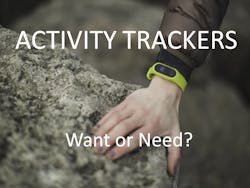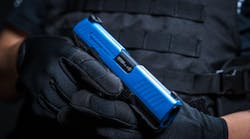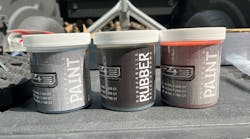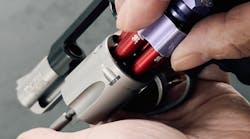If you look at people in gyms, at work, or in restaurants you will likely see some of them wearing an activity tracker. This new technology in the fitness industry has been all the rage the past couple of years. However, just because the devices are popular doesn’t mean you should buy one. Let’s take a look at what a fitness-tracking device can do and whether it’s right for you.
Trackers are able to record and calculate a number of things about your daily activities. And of course the more things you hope to track, the more expensive the item’s price tag, up to $500.00 on the high end. Some folks, me included, use a smart phone to track their exercise routine, but a fitness tracker device works a bit differently. What are some of the capabilities of these electronic devices?
- Counting steps: many people wear these devices strictly for this reason only. Dr. Yoshiro Hatano led a research study in the 1960s that determined a goal of 10,000 steps per day would be sufficient to burn around 20% of daily caloric intake. That standard is still used today, and if that’s the reason you’re interested in getting a tracker they can be had for as little as $15.00.
- Heart rate: your rate is measured while you’re awake and while asleep. By comparing heart rates over time, one can determine whether their fitness level is improving or not. While some devices give readouts on heart rate, the numbers are not as accurate as a medical monitor strapped to your chest.
- Sleep: without sufficient sleep, one’s overall health suffers. Trackers measure movement during the night to determine number of hours slept.
- Overall Workouts: you’ll need a device with a GPS chip to accurately track workouts. Distance run, walked, or biked can be tracked by using an app on your computer or smart phone synced up to the tracker. The downside of the GPS chip is it cuts battery life and adds cost to the unit. However, if you are a competitive athlete this feature is a must have.
- Body temperature: some high-end trackers use a temperature sensor that rests against your skin. This measurement may help determine if you’re overheating during a workout.
On its face, using an activity tracking device sounds like a great idea. One can easily track important things like heart rate and types of workouts. Some even go as far as prompting you to get up and move if you’ve been seated too long, or to drink water to stay hydrated. However, some wearers offer a different perspective. Many purchase a device in hopes of losing weight, but while the device provides some overall health benefits if used properly, it may also have downsides and not help with weight loss.
Researchers at Stanford University found that while many devices measured heart rates fairly accurately, they did not accurately measure calories burned. Another study (TRIPPA) showed the apps failed to produce improvements in blood pressure or weight. A third study in the JAMA indicated patients wearing trackers did not perform better than those without them in a weight loss intervention program.
Seriously, do you really need a device to prompt you to exercise? Personally, I do not. However, if a tracker can get people off the couch and on their feet it’s worth the money. Additionally, people with diabetes can gauge the impact of exercise on their blood glucose levels. That’s important.
One thing to consider before buying a device is the possibility of technology overload. Many of us already stare at a computer screen all day at work, as well as perusing our smart phone to sort through social media and text messages. After a while it all becomes too much. The activity tracker can also be distracting with its audible reminders to get up and move or telling you to drink more water. After a while, you may just decide to turn it off and throw it in a drawer. Collected data from sources such as Nielsen, show that anywhere from a third to half of fitness tracker users abandon the device after just a few months. Reasons for discontinuing using a device include boredom, bulkiness, lack of style, difficulty syncing, or broken devices.
It’s estimated that 20% of Americans own a tracker and many of them are older adults. The bad news is about half of those who own them don’t often use them. The tracker can be discouraging if one falls behind on their fitness goals. And older adults who walk slower may not have an accurate count of their daily steps. But if you’re into being fit and competitive, an activity tracker may fit your lifestyle. Click here for a review of the best trackers available today.
Technology is exciting and interesting, but it may not be the best tool to measure fitness or reach goals. Old schools devices—the scale and mirror—are a tried and true method to track progress. If you look better in the mirror, or your weight has dropped, ask yourself why. What changed the past several weeks or months? You don’t need technology to determine why a change has occurred. Pay attention to your body, is it becoming easier to walk up that hill, or are you no longer short of breath when you run to the corner? Sometimes simple is best. Getting back to basics seems to work for many things, and measuring one’s fitness is certainly one of them.
Stay Safe, Brothers and Sisters!



